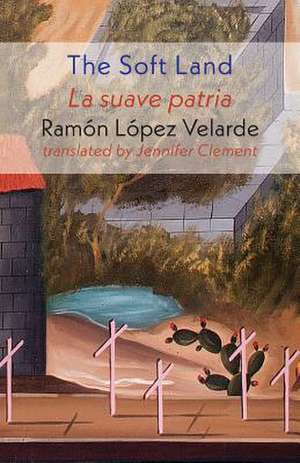The Soft Land
Autor Ramon Lopez Velardeen Limba Engleză Paperback – 15 sep 2017
Preț: 123.99 lei
Nou
Puncte Express: 186
Preț estimativ în valută:
23.73€ • 24.72$ • 19.64£
23.73€ • 24.72$ • 19.64£
Carte tipărită la comandă
Livrare economică 03-17 aprilie
Preluare comenzi: 021 569.72.76
Specificații
ISBN-13: 9781848615489
ISBN-10: 1848615485
Pagini: 68
Dimensiuni: 140 x 216 x 5 mm
Greutate: 0.14 kg
Editura: Shearsman Books
ISBN-10: 1848615485
Pagini: 68
Dimensiuni: 140 x 216 x 5 mm
Greutate: 0.14 kg
Editura: Shearsman Books
Notă biografică
Ramón López Velarde, (1888-1921), modernist Mexican poet who incorporated French Symbolist techniques into the treatment of purely Mexican themes. López Velarde studied law and was a journalist and civil servant. His first book of poems, La sangre devota (1916; "The Pious Blood"), treats the simplicity of country life, the tension between sensuality and spirituality, and the poet's love for his cousin Fuensanta (Josefa de los Ríos); the language is often complex and full of daring imagery. In Zozobra (1919; "Uneasiness") the themes of his previous work are treated with greater intensity. The death of Fuensanta in 1917 elicited the feelings of loss and anguish and the expressions of profound sensuality found in the poems. El son del corazón (1932; "The Sound of the Heart") collected the poems not published at the time of López Velarde's death. Although his poetry did not gain recognition during his lifetime, López Velarde came to be considered one of the greatest Mexican poets of the century. His influence on avant-garde poets in Mexico is unquestionable. He is also the author of the essay collections El minutero (1933; "The Minute Hand"), El don de febrero (1952; "The Gift of February"), and Prosa política (1953; "Political Prose"), dealing with some of the same preoccupations of his poetry in a highly poetic style.
Descriere
`La suave patria' is often regarded as the Mexican national poem, an extraordinary tour-de-force that would change forever the way that poetry would develop in Mexico. It was one of the last works by Ramon Lopez Velarde, who died of pneumonia at the age of only 33 in 1921, and is the work for which he is most remembered today.
